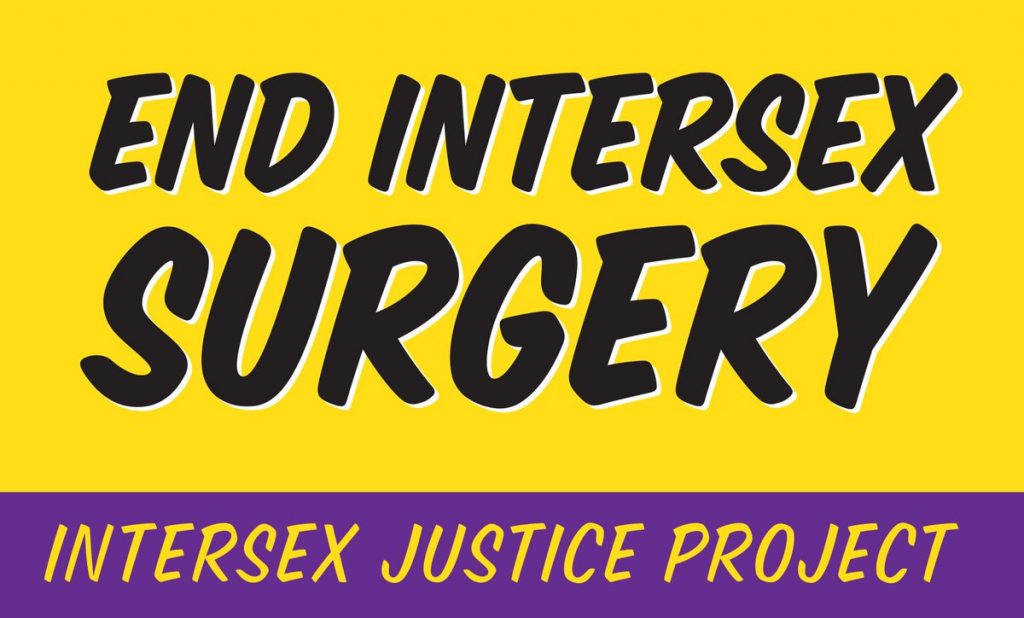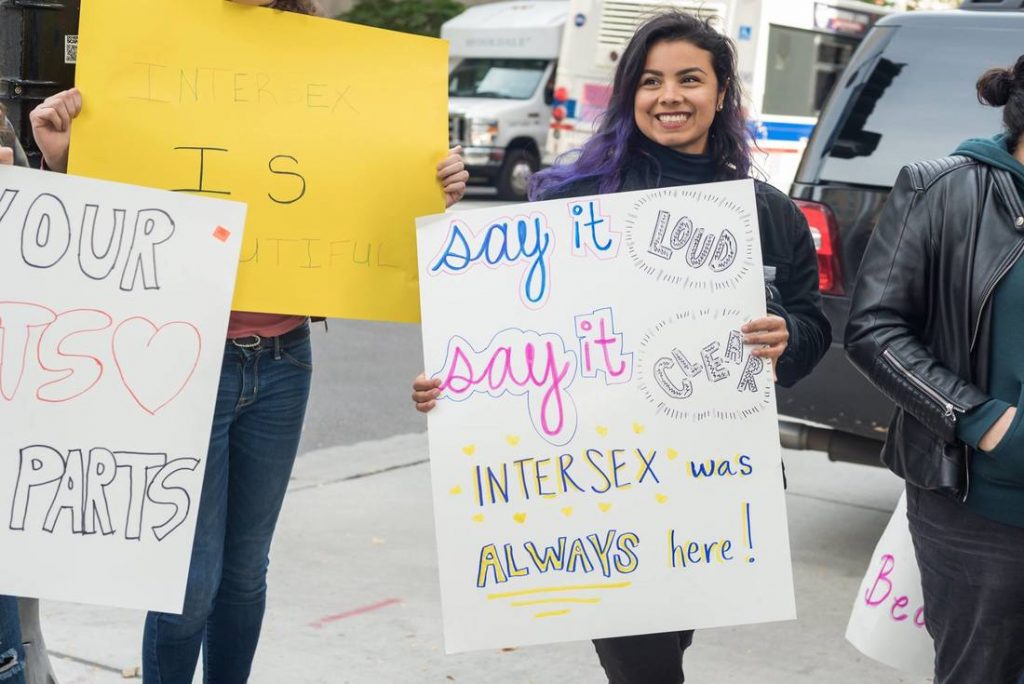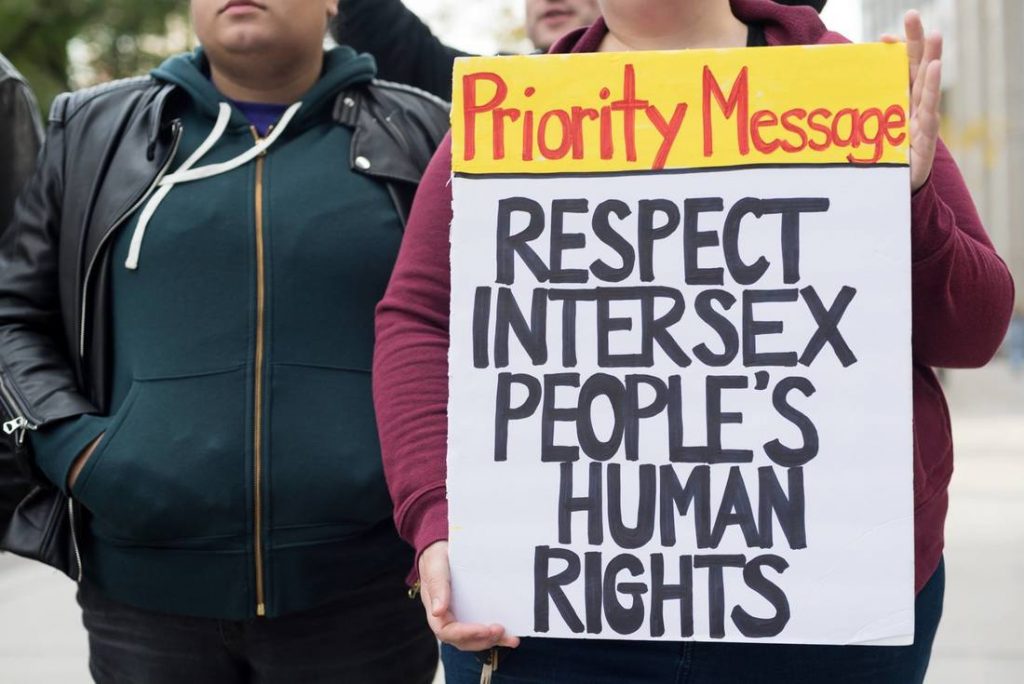
This issue should not be a bipartisan issue. This is an issue regarding human rights and the equal protection of every individual living in the United States.
By: Aiza Shah
A doctor delivers a new baby in a hospital and informs the parents that the child has the sexual characteristics of both a male and a female. The parents have never heard anything about this and glance nervously between each other. The doctor is quick to reassure them, however, that a common surgery can be performed to make the baby more clearly resemble a female. The parents decide that surgery would be the best option for their new child. Much to her parents’ delight, the baby is now presenting more like a female. At this point, the parents are oblivious to the fate they have assigned their child: the baby sitting in her parent’s arms could face a lifetime of scarring, destroyed nerve function in her genitalia, and infertility. This tragic experience is shared among thousands of intersex individuals across the United States, whose bodily autonomy is not protected by U.S. legislation.
Most Americans are unfamiliar with what it means to be “intersex.” Intersex is a term used to describe people who are born with reproductive or sexual anatomy that doesn’t fit within traditional definitions of male or female. In some cases, an intersex infant may be born with genitals that seem to be somewhere in-between male and female anatomy. For example, a baby can be born with an enlarged clitoris that resembles a small penis or with a divided scrotum that looks like labia. In other cases, infants may have external sex organs that don’t match their internal reproductive organs. For example, an infant can have external sex organs that resemble those of a male, but have typical female internal organs, such as a uterus and ovaries.
Approximately 1.7% of people are born intersex. This is a large number of people, especially when considering the fact that 1-2% of the population is born with red hair. Although many people identify as intersex, the intersex community is an often-misunderstood group that has long faced discrimination.
For over fifty years, physicians across the country have advocated for surgery to make the anatomy of intersex babies fit more clearly into the categories of male or female. Doctors may be well-intentioned, but by the mid-1990s, intersex adults made it clear that non-consensual operations were traumatizing. Cosmetic genital surgeries destroy nerve function, and many who have early surgery need multiple follow-up surgeries to deal with scarring and other issues. In 2008, the United Nations condemned female genital mutilation and genital cosmetic surgeries. The international non-profit Human Rights Watch has also ruled genital cosmetic surgeries a human rights violation. Many intersex individuals believe the best option for intersex babies is to delay treatment until puberty or adulthood so that patients can give informed consent to surgery.
Earlier in 2020, in a historic first, the Ann & Robert H. Lurie Children’s Hospital of Chicago became the first hospital in the United States to ban cosmetic surgeries on intersex infants. The hospital will no longer perform such surgeries unless medically necessary or with willful consent from fully informed patients. Alongside the ban, the hospital issued a public apology, signed by the hospital’s CEO and three head physicians, for performing cosmetic surgeries on intersex infants. The ban and apology were driven by years of activists calling on the institution to make the changes. This decision was historic and sets an admirable precedent in the United States, but it also reminds us that so much more needs to be done. One hospital is not enough.
Bans on infant intersex surgery has recently been proposed in California legislation. In January of 2019, Senator Scott Wiener introduced Senate Bill 201 Medical procedures: treatment or intervention: sex characteristics of a minor.
Had it passed, SB 201 would have been the first legislation in the United States to ban cosmetic genital surgeries on intersex babies. This bill originally called for a ban on all genital surgeries that are not medically necessary until a child is old enough to provide informed consent. Senator Wiener later amended the legislation to say a child must be at least 6 years old before a doctor can perform cosmetic genital surgery because many thought the bill failed to make clear the age at which a child is old enough to consent. The introduction of this legislation was a landmark moment for the intersex community. Unfortunately, however, the bill failed in the Senate’s Business, Professions and Economic Development Committee in early 2020 when Committee Chairman Senator Steven Glazer opposed the bill and led three senators to decline to vote on it. The bill also faced opposition from various California Medical organizations, including the influential doctors’ lobby, the California Medical Association. The California Medical Association worries that the bill makes an exception for any procedure or treatment that is deemed medically necessary, which is defined in such a way that cannot properly address the complexity of disorders of sex development cases and potentially endangers the physical and emotional health and future of the patient. According to CNN an independent committee to support Glazer’s reelection received a $50,000 contribution from the California Medical Association’s lobbying group before the vote. Because it had failed a key vote, the bill has effectively been tabled until the next legislative session.
Senator Scott Wiener seems hopeful that the vote against the bill earlier this year was only a setback in the struggle for civil rights. He stated, “Today’s vote was a setback, but this is only the beginning. We aren’t giving up on protecting intersex people from non-consensual, invasive, dangerous surgery. As with many civil rights struggles, it sometimes takes multiple tries to prevail. We will be back.”
InterACT, an organization which uses innovative legal strategies to advocate for the human rights of children born with intersex traits, is hopeful that other legislation will create impact in the future. Intersex advocate and Communications Director at InterACT, Hans Lindahl, told Law at the Margins: “We’re looking to see that intersex individuals get their own choices about their bodies, just like anyone else. If people want surgery to change the appearance of their genitals, they can choose it later, but if they don’t and have it chosen for them, they’ll never have options. We can’t know which baby will be which. Once intersex people get the same choice about their bodies and sexual futures as anyone else, we’ll be able to focus more on other issues that matter to our communities. We’ll be moving toward a future where differences are valued, where choice is valued. But we can’t get there if our basic rights are still being so deeply violated.”
This issue should not be a bipartisan issue. This is an issue regarding human rights and the equal protection of every individual living in the United States. Rejecting protective bills like SB 201 sends a negative message that the rights of sexual minorities and gender non-conforming people should be ignored. It is past time for legislative representatives to reach across the aisle to make real, meaningful change for the intersex people living all over the United States.
There are a number of ways individuals can help, even from home. Reading detailed pieces on the topic is important. Educating family and friends about intersex people is a great place to start. Change can also be made through opposing non-consensual surgeries and laws working against intersex individuals, supporting positive legislation that changes the standards for non-consensual surgeries on intersex individuals, and donating to various advocacy organizations for intersex individuals. The most important thing anyone can do is treat intersex individuals with respect; encourage the same behavior from others and educate the people around you. Intersex rights are human rights.
Resources for intersex individuals and allies:
InterACT Advocates for Intersex Youth: https://interactadvocates.org
InterACT Advocates for Intersex Youth: https://interactadvocates.org/resources/intersex-brochures/
Intersex Initiative: Resources for Students: http://www.intersexinitiative.org/academia/students.html
TGI Justice Project: http://www.tgijp.org






